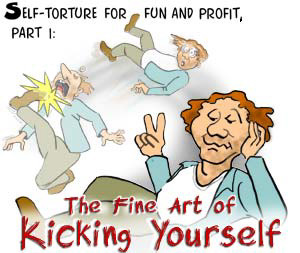 |
|
||||||||||||
|
About San
inSANity columns: The
Better You Are, When
The Bastards Ugly Brides and Other Temptations Will The Real Freaks Please Raise Their Hands? The Fine Art of Kicking Yourself |
That is what the highest criticism really is, the record of one's own soul… concrete and not abstract, real and not vague. We recently put together the first issue of our new print magazine -- I guess you could call it Son of Webzine. I have a long history of mammoth projects and 13-hour workdays, but this particular undertaking transcended mammoths -- it was closer to dinosaurian in size. Bad paleological metaphors aside, I found myself staring down the throat of some terrifying deadlines. Part of my solution was to drop some of my editor-in-chief balls on the floor (luckily the other editors scooped them up) and concentrate on my other role as creative director. But I also scrambled around looking for design and production help. I found it, eventually, but an interesting thing happened before I did. Trying not to reek of desperation, I asked a graphic designer I know if he could help. He said no. He gave the usual good reason -- no time -- but he also said something that I found intriguing. I should explain that this guy isn't currently working as a designer; he's involved in a related, but more analytical, activity. Anyway, he said that he doubted he'd ever go back to being a designer. "Doesn't pay enough?" I asked. No, he said, that wasn't it. He'd decided that he was more of a left-brain guy and should leave actual design work to right-brained people. Now, the supposed left brain/right brain dichotomy is so deeply lodged in our culture that to cast doubt on it seems positively un-American. But it happens to be neurologically simplistic (the corpus callosum is a fairly good integrator) and, more important, it's a continual threat to my professional credibility (who says I can't be a serious writer and a serious visual artist?). But I restrained myself from giving my friend an impromptu lecture on the anatomy of gray matter and merely remarked that, as far as I could tell, he was a pretty good designer. Why did he think he wasn't? He mentioned a magazine that had launched a few years ago with a rather innovative -- in fact, startling -- design. "I look at that," he said, "something that brilliant, something that… original… and I think, that's the work of real designers. I could never come up with something like that." I admitted that I, too, would be unlikely to come up with a design that remarkable. But why would that knowledge of his own limitations stop him from doing design work? "What's the point, if I could never be that good?" he asked. "Listen," I said. "Francisco Goya happens to be one of my personal gods. When I look at the paintings he did near the end of his life, I know that if I live to be a hundred fifty I'll never paint anything that good. So does that mean I should never paint again? Forget about me. How about the hundreds of outstanding painters over the centuries -- great artists whose work ultimately excited millions, but who weren't as good as Goya -- should they have stopped painting?" "Of course not," he said, smiling. He conceded my point: not being one of the best-ever people in your field doesn't mean you should give it up and flip burgers for a living. On the other hand… he still didn't offer to help me with the magazine. Damn. Castigations of the Rich and Famous The conversation with my designer friend got me to pondering the nature of self-criticism. I realized that not only is my friend a pretty good (and smart) designer, but the very fact that he was capable of seeing his own limitations so clearly, that he could look at somebody else's design and see that it was better than his own, is probably related to how he became a good designer in the first place. It might even be his greatest asset. My point, by the way, has nothing to do with design; this isn't a column about design or painting. You show me professionals in any field who look at their own work and think, complacently, that it's as good as it needs to be, and I'll show you professionals who probably ought to flip burgers for a living. Think of, and look at, your work as though it were done by your enemy. If you look at it to admire it you are lost. When William Shakespeare (in Sonnet 29) described himself as feeling inferior to others around him, "Desiring this man's art, and that man's scope," do you think that was just false modesty, or poetic license? After all, Shakespeare was successful and critically acclaimed in his own lifetime; in another sonnet, he boasted that the sonnet would live forever. How could he believe that, yet simultaneously feel jealous of the greater "art and scope" of other men? But then we remember that Shakespeare lived in a remarkable time, surrounded by many extraordinary Elizabethans who, as "Renaissance men," had numerous skills that he lacked (although playwriting was presumably not among them). And we recall that Shakespeare based virtually all his plots on the work of others, and therefore must have been focusing his attention on some of history's greatest writers up to that time. Presumably, he couldn't help noticing some specific skills of theirs that he (great as he was) lacked, including the ability to invent great plots from scratch. The point is that Shakespeare could think of himself as a great poet and still be intensely self-critical. It only seems like a contradiction. In fact, the two attitudes are closely connected. Or consider the late, great English painter Francis Bacon. He once told an interviewer that each of his paintings would only start to come together when he got disgusted with how bad it was, which would cause him to start throwing paint at the thing in despair. Do you think he was just teasing the interviewer? On the contrary, from everything I've read about him, I'm certain he was telling the truth. A smaller soul than Shakespeare or Bacon might not have tortured himself about his own limitations that severely. The few professionals who become great do so, at least in part, because they relentlessly criticize themselves. That's the inevitable first step to getting better at what they do. Limitations Are So... Limiting In fact, it's tempting to suspect that there's an inverse correlation between how satisfied people are with their own work and how good they really are, or can become. Tempting, but simplistic -- since the converse of the Shakespeare phenomenon is not necessarily true. Obviously there are some people who are intensely self-critical and always struggling to improve their skills... but who nonetheless work in the wrong field, produce work that stinks, and always will. Still, being bothered by your own limitations, and being able to see them clearly, tends to be correlated with getting better at what you do. As long as I have a want, I have a reason for living. Satisfaction is death. By the way, self-criticism is even more important for independent professionals than it is for regular employees, because wage slaves usually get criticism from their bosses, but IPs are more likely to be dropped without explanation by unhappy clients. As with so many other things, criticism is something that IPs often have to supply for themselves. Unfortunately, simply becoming aware of your own limitations isn't enough. In fact, the habit of perpetual self-criticism, in and of itself, is just as likely to be associated with inefficient neurotics as it is with successful professionals. Assuming your goal is success rather than neurosis, you need to distinguish between the kind of self-probing that leads to improvement and the kind that leads to paralysis. If this is difficult, try writing down a list in three columns. The first column lists your self-criticisms. The second column summarizes your plan for improving each item in the first column. The third column lists realistic goals with dates. If you can't do this, your self-criticism may not be of the useful variety. Follow the Fault-Finding Road Here's where we've come so far: First, the turnpike to excellence is a toll road, and the coin you pay is intense self-criticism (also practice, but that's another column). Second, make sure that when you whip yourself, you're doing it in a constructive way and not just for the sheer pleasure of it. Finally... finally will have to wait for the next column, where we'll look at two related aspects of time: how delays help you to evaluate your own work, and -- an almost opposite point -- the need for speed. To become a true master at what you do, you have to become self-critical really fast -- blindingly fast -- so fast that the criticism and the work cease to be separate processes at all. |
|
|
[Read Part II of this column: Fresh Eyes and Feedback Loops] San was the founding editor of 1099 Magazine, serving as its first editor-in-chief and creative director. He's now back in the boss-free world as a freelance writer and illustrator. In addition to the inSANity column on 1099, San's other writings and cartoons are at www.sanstudio.com. We'd love to hear your feedback about this column. |
||
|
|
||
The 1099 name and logo are trademarks of 1099 Magazine.

